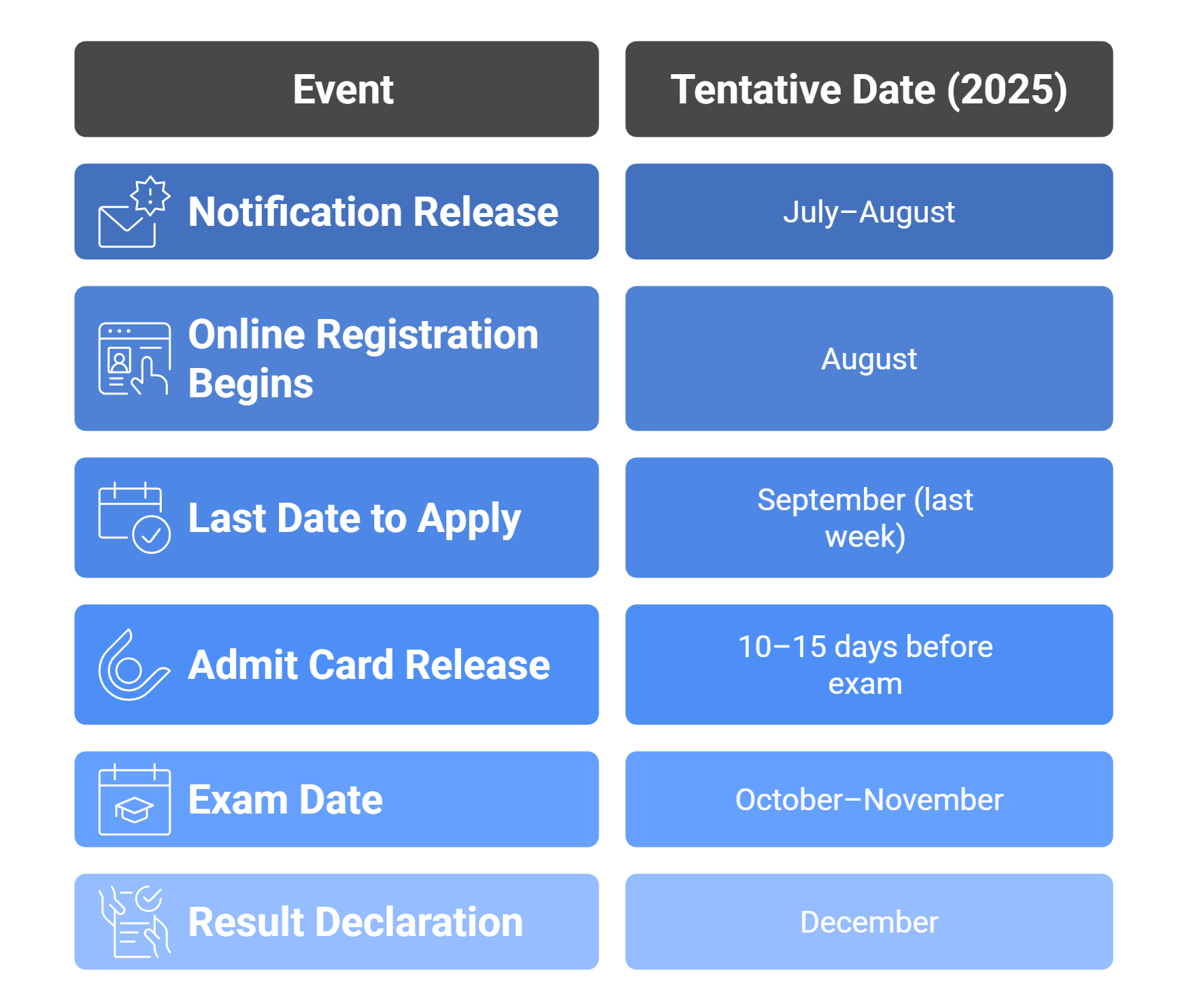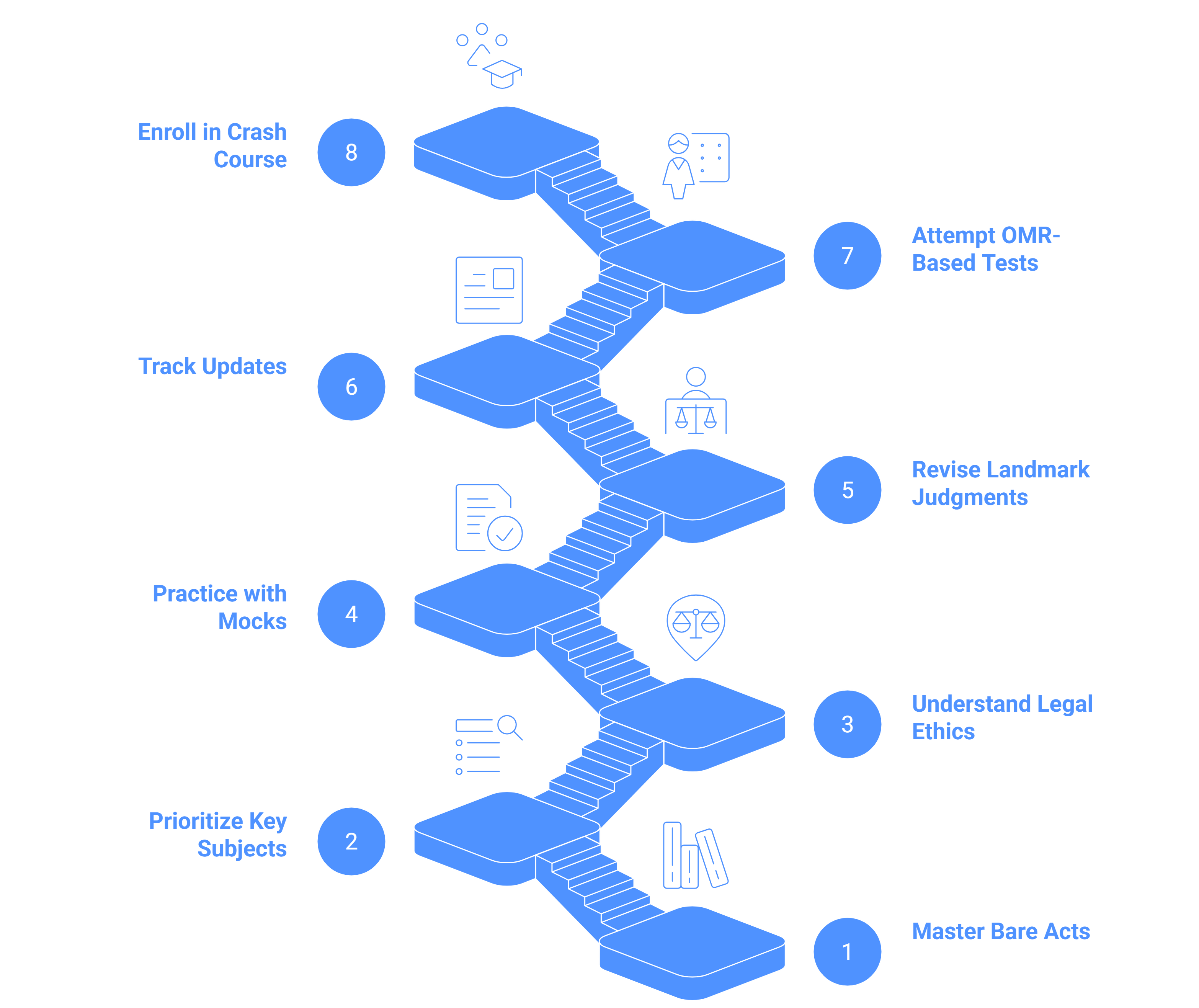Home / AIBE Exam
AIBE
All India Bar Examination (AIBE) Syllabus & Strategy
18-Jul-2025
Table of Contents
- AIBE 2025 Strategy: A One-Stop Guide for Aspirants
- What is AIBE and Why Is It Important?
- What are the Eligibility Criteria for AIBE?
- What are the Tentative Dates and Timeline for AIBE 2025?
- What is the Exam Structure and Syllabus of AIBE?
- What is Certificate of Practice (COP)?
- Supreme Court Verdict and the Three-Year Practice Rule
- What is the Best Preparation Strategy for AIBE?
- Difficulty Level in Recent Years
- Conclusion
- Frequently Asked Questions (FAQs) Related to AIBE
Introduction
The All India Bar Examination (AIBE), conducted by the Bar Council of India (BCI), is a certification exam that grants the Certificate of Practice (COP) to law graduates. Over the years, AIBE has become more than just a formality; it is now a legal prerequisite for appearing in judicial services exams and for engaging in professional practice across India. The recent Supreme Court judgment reinstating the three-year mandatory practice clause has further increased the significance of this examination.
This article is a complete strategy document for AIBE aspirants. We address not only the structure and syllabus of the exam but also its legal relevance, eligibility, post-exam process, and preparation roadmap.
What is AIBE and Why Is It Important?
AIBE is an open-eligibility, nationwide exam designed to assess whether a law graduate possesses the foundational legal knowledge required for professional practice. Successful candidates are issued a Certificate of Practice by the Bar Council of India. Without this certificate, one cannot legally practice law in courts (State Bar Council certificates are valid for two years only), and in light of the Supreme Court's 2025 verdict, cannot claim the necessary legal experience for judicial service examinations.
The exam is conducted annually and is available in multiple languages.
What are the Eligibility Criteria for AIBE?
As per the latest notification and Supreme Court directives:
- Final-year or final-semester students of 3-year or 5-year LL.B. programs are eligible to appear for AIBE, provided they have no backlogs.
- Law graduates who have completed their LL.B. are also eligible, even if they have not yet received their degree certificate.
- Law graduates.
- Enrollment with a State Bar Council is not mandatory at the time of registration, but it is required to obtain the Certificate of Practice after clearing the exam.
- There is no age limit, and there is no restriction on the number of attempts.
- Only Indian citizens with degrees from BCI-recognized institutions are eligible.
What are the Tentative Dates and Timeline for AIBE 2025?
Note: Always verify current dates on the official website,
What is the Exam Structure and Syllabus of AIBE?
AIBE is a 3-hour 30-minute offline (pen-paper based) test consisting of 100 multiple-choice questions (MCQs). The marking scheme is:
- Total Questions: 100 (as per AIBE XIX)
- Total Marks: 100
- No Negative Marking
- Passing Criteria: 45% for General/OBC; 40% for SC/ST and Disabled Candidates
The questions are distributed across 19 major legal subjects:
|
Subject |
Number of Questions (approx.) |
|
Constitutional Law |
10 |
|
Indian Penal Code and Bharatiya Nyaya Sanhita |
8 |
|
Code of Criminal Procedure and Bharatiya Nagarik Suraksha Sanhita |
10 |
|
Code of Civil Procedure |
10 |
|
Evidence Act and Bharatiya Sakshya Adhiniyam |
8 |
|
Law of Tort, including Motor Vehicle Act and Consumer Protection Law |
5 |
|
Family Law |
8 |
|
Administrative Law |
3 |
|
Company Law |
2 |
|
Environmental Law |
2 |
|
Cyber Law |
2 |
|
Labour and Industrial Law |
4 |
|
Intellectual Property Law |
2 |
|
Professional Ethics & Cases of Professional Misconduct under Bar Council of India Rules |
4 |
|
Land Acquisition Act |
2 |
|
Law related to Taxation |
4 |
|
Alternative Dispute Resolution including Arbitration Act |
4 |
|
Law of Contract, Specific Relief, Property Laws, Negotiable Instrument Act |
8 |
|
PIL |
4 |
What is Certificate of Practice (COP)?
The COP is issued after the declaration of AIBE results. While the certificate may be available digitally, many State Bar Councils require in-person collection.
Key points to note:
- One must apply for the COP within two years of passing AIBE and enrolling with a State Bar Council.
- Without a valid COP, one is not legally permitted to practice law in India.
- It is now a mandatory document for proving eligibility in judicial service exams, particularly in light of the Supreme Court’s May 2025 ruling.
What is the Best Preparation Strategy for AIBE?
Given its closed-book nature and wide syllabus, AIBE demands methodical and consistent preparation. Here is a practical approach:
- Focus on understanding rather than memorization. Tab important sections in each Bare Act for quick reference.
- Allocate more time to high-weightage subjects like Constitutional Law, IPC, CrPC, CPC, and Evidence.
- Professional misconduct and ethics are a significant component and often contain conceptual and situational questions.
- Attempt full-length mock tests under timed conditions to improve speed and accuracy.
- Although the exam is primarily objective, awareness of recent and landmark judgments helps contextual understanding.
- Keep abreast of the latest notifications on the official website and follow credible sources like drishtijudiciary.com.
- Since the AIBE is an OMR-based paper, practice filling OMR sheets correctly to avoid technical mistakes during the real exam.
- Consider Enrolling in a Crash Course: A crash course helps consolidate preparation and stay focused in the final stretch. It also gives you the belief that remaining engaged in your regular work while devoting some time to a structured course can be enough to crack the exam.
Difficulty Level in Recent Years
The last two editions of AIBE (XVIII & XIX) have seen a significant increase in difficulty level:
- More conceptual questions, especially in procedural laws.
- Reduced reliance on rote-based direct Bare Act extracts.
- Introduction of case-based and application-based MCQs.
Aspirants must now prepare for AIBE with the seriousness of a competitive examination rather than treating it as a qualifying hurdle.
Conclusion
AIBE is no longer a peripheral formality; it is the first statutory and professional milestone for any law graduate in India. The Certificate of Practice has become central not only to courtroom advocacy but also to eligibility for judicial service and other legal posts. As the legal landscape evolves, candidates must approach AIBE with the seriousness of a competitive examination.
Consistent preparation, a strong grasp of bare acts, and an awareness of the legal framework are essential to cracking AIBE and moving confidently into a career in law or the judiciary.
Frequently Asked Questions (FAQs) Related to AIBE
Q. Is it mandatory to clear AIBE to practice in court?
- Yes. Without the Certificate of Practice granted after AIBE, no law graduate can practice in any Indian court.
Q. Can final-year students take the AIBE?
- Yes, provided they have no backlogs. This has been permitted under interim Supreme Court orders.
Q. Is enrollment with the State Bar Council necessary before AIBE?
- Not at the time of the exam. However, enrollment is required to obtain the Certificate of Practice.
Q. How many attempts are allowed for AIBE?
- Unlimited.
Q. What is the passing mark for the AIBE?
- 45% for General/OBC candidates; 40% for SC/ST candidates.
Q. Does the clerkship count towards the 3-year experience requirement?
- Yes, subject to certification from a judge or relevant court authority.


